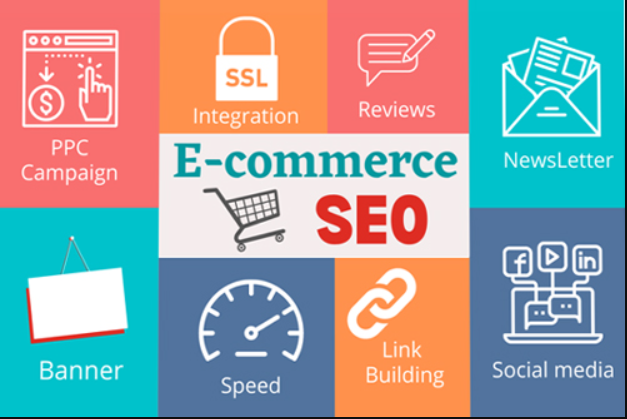In today’s competitive online marketplace, businesses are constantly looking for ways to stand out. With consumers increasingly turning to e-commerce platforms to fulfill their shopping needs, it’s no surprise that search engine optimization (SEO) has become an integral part of any successful e-commerce strategy. As technology continues to evolve, so does the way we approach E-commerce SEO. In this post, we’ll explore the future of Ecommerce SEO and provide actionable insights on how businesses can stay ahead of the curve by optimizing their SEO strategies for long-term success.
The Evolving Landscape of Ecommerce SEO
Over the years, SEO has dramatically evolved. What once relied heavily on keyword density and backlinks has transformed into a more sophisticated and user-centric discipline. For e-commerce businesses, staying updated with the latest SEO trends and algorithms is crucial to ensuring visibility and higher sales. The future of Ecommerce SEO is set to be more personalized, mobile-first, and driven by artificial intelligence (AI) and machine learning.
Let’s break down the key trends shaping the future of e-commerce SEO:
1. Voice Search Optimization
With the rise of voice-activated devices such as Amazon’s Alexa, Google Assistant, and Apple’s Siri, optimizing for voice search has become a game-changer. Studies suggest that nearly 50% of all searches will be voice-based by 2026. This shift demands a rethinking of SEO strategies for e-commerce businesses.
Voice searches are typically longer and more conversational than traditional text searches. This means e-commerce websites need to focus on optimizing for natural language and question-based queries. For instance, instead of just targeting “best running shoes,” a voice search might phrase the query as “What are the best running shoes for flat feet?”
To succeed in voice search optimization, consider integrating long-tail keywords and natural phrases into your product descriptions, FAQ sections, and blog posts. Additionally, ensuring that your website is mobile-friendly and loads quickly is essential for capturing voice search traffic, as most voice searches come from mobile devices.
2. AI and Machine Learning’s Role in SEO
Artificial intelligence and machine learning are reshaping how search engines rank websites. Google, for example, has implemented AI-driven algorithms like RankBrain, which focuses on understanding the intent behind search queries. As AI continues to improve, search engines will get better at identifying not just keyword relevance but also user satisfaction and content quality.
For e-commerce websites, this means that traditional SEO techniques may no longer suffice. The focus will shift to creating valuable, user-centered content that answers specific customer questions and solves problems. Additionally, AI will play a more prominent role in personalizing the shopping experience. For instance, AI-powered recommendations based on user behavior will influence SEO strategies, pushing businesses to enhance their site’s navigation and content to cater to personalized shopping experiences.
E-commerce SEO services will need to adjust by ensuring that their strategies align with AI’s focus on user experience and intent. This includes enhancing site speed, optimizing for mobile users, and creating high-quality, engaging content that meets customer expectations.
3. Mobile-First Indexing
Mobile-first indexing is already a reality, and it’s only going to become more critical in the future. Google now uses the mobile version of a website as the primary source for ranking and indexing, making mobile optimization a top priority. With the increasing use of smartphones for online shopping, mobile-optimized websites are essential for providing a seamless experience for users.
An e-commerce website must prioritize a mobile-first approach. This includes responsive design, fast loading times, and an easy-to-navigate interface. The mobile version of your site should be as functional as the desktop version, ensuring users can browse, shop, and make purchases effortlessly. If your site isn’t mobile-friendly, it risks falling behind in the search rankings.
If you’re looking to boost your rankings and visibility, consider investing in professional Ecommerce SEO services that specialize in mobile-first optimization.
4. Video Content and Visual Search
As video consumption continues to rise, e-commerce brands are increasingly integrating video content into their SEO strategies. Videos have been shown to improve engagement rates, reduce bounce rates, and enhance product visibility. YouTube is the second-largest search engine in the world, and e-commerce businesses can leverage video marketing to drive traffic and boost their SEO efforts.
Incorporating videos into product pages, creating how-to guides, or offering customer testimonials can increase the time visitors spend on your site, which positively impacts SEO rankings. You can also use video content on social media platforms to generate backlinks and increase brand awareness.
Visual search is another trend that is gaining momentum. Tools like Pinterest Lens and Google Lens allow users to search for products using images. E-commerce businesses will need to optimize their product images with proper descriptions, alt text, and high-quality visuals to ensure they are discoverable through visual search.
5. Enhanced E-Commerce SEO Packages
As e-commerce SEO continues to grow in complexity, businesses will increasingly rely on comprehensive E-commerce SEO packages that offer a range of services to optimize their websites. These packages typically include technical SEO, content creation, keyword research, and backlink strategies.
Investing in tailored E-commerce SEO packages can give your business a competitive edge by addressing all aspects of SEO in one comprehensive strategy. Whether you are a small e-commerce store or a large retailer, customized SEO packages can help you focus on the areas that matter most for your specific goals and target audience. An experienced SEO agency will ensure that your e-commerce site stays ahead of the competition by using the latest tools, techniques, and strategies to drive organic traffic and increase sales.
6. E-commerce SEO and User Experience (UX)
User experience (UX) is another significant factor in the future of E-commerce SEO. Search engines are increasingly rewarding websites that offer great UX, as they correlate with higher engagement rates and conversions. A site that loads quickly, is easy to navigate, and provides a smooth checkout process will not only rank better but will also keep customers coming back.
Improving UX on your e-commerce site involves several components:
- Intuitive navigation: Simplify the customer journey from product search to purchase.
- Fast loading times: Aim for a loading time of under 3 seconds to reduce bounce rates.
- Clear product descriptions: Ensure customers can easily find all the information they need to make informed purchase decisions.
By focusing on UX, e-commerce businesses can create a website that not only ranks well on search engines but also delivers a seamless experience for users, ultimately driving more conversions.
Conclusion: Embrace the Future of Ecommerce SEO
As the e-commerce landscape continues to evolve, businesses must stay proactive in adapting to the changing SEO trends. Voice search, AI-driven algorithms, mobile-first indexing, video content, and personalized E-commerce SEO packages are just a few of the key trends that will shape the future of online shopping.
By investing in comprehensive E-commerce SEO services, businesses can build a strong online presence, improve visibility, and drive long-term success. The future of Ecommerce SEO is about putting customers first, embracing technological advancements, and consistently optimizing your website for better user experiences and higher conversions.
If you haven’t already, now is the time to start optimizing your website for the future of Ecommerce SEO.



